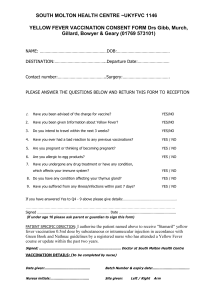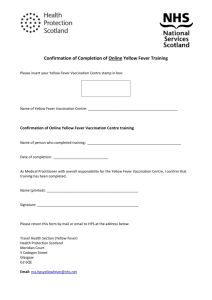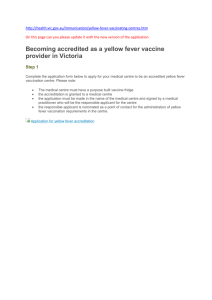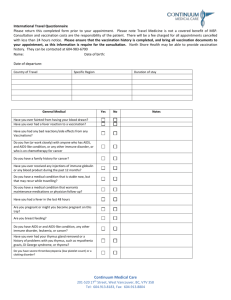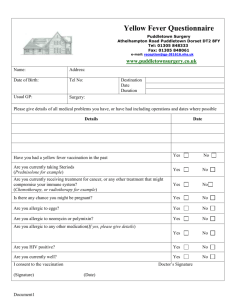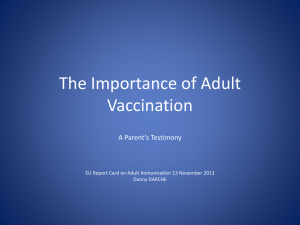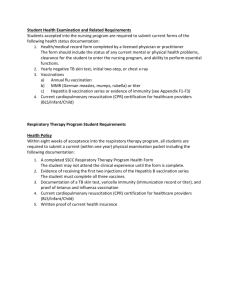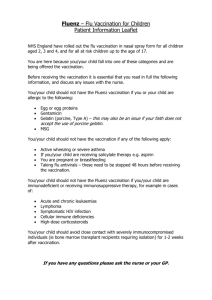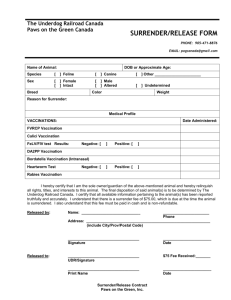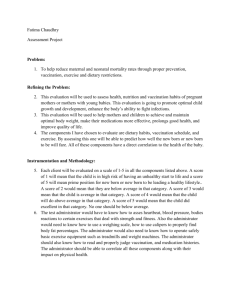Yellow fever information
advertisement
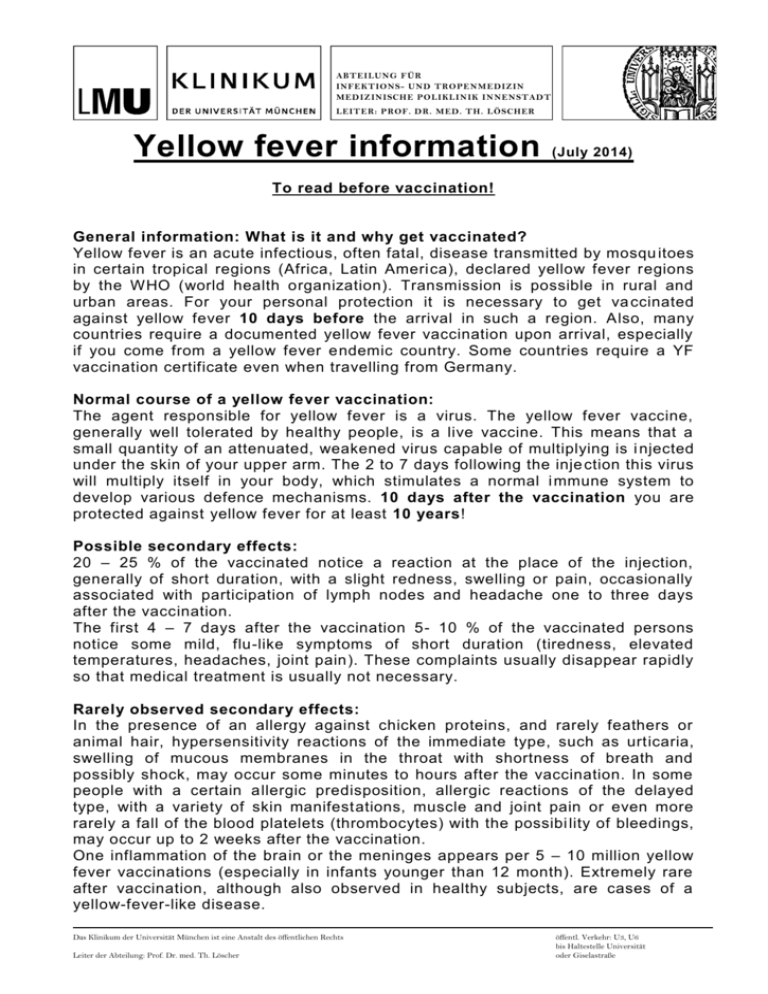
ABTEILUN G F ÜR INFE KTION S- UND TRO PE NME DIZIN MED IZINISCHE PO LIKLIN IK IN NEN STADT LEITE R: PROF. D R. MED. TH. LÖSCHER Yellow fever information (July 2014) To read before vaccination! General information: What is it and why get vaccinated? Yellow fever is an acute infectious, often fatal, disease transmitted by mosqu itoes in certain tropical regions (Africa, Latin Ameri ca), declared yellow fever regions by the WHO (world health organization). Transmission is possible in rural and urban areas. For your personal protection it is necessary to get va ccinated against yellow fever 10 days before the arrival in such a region. Also, many countries require a documented yellow fever vaccination upon arrival, especially if you come from a yellow fever endemic country. Some countries require a YF vaccination certificate even when travelling from Germany. Normal course of a yellow fever vaccination: The agent responsible for yellow fever is a virus. The yellow fever vaccine, generally well tolerated by healthy people, is a live vaccine. This means that a small quantity of an attenuated, weakened virus capable of multiplying is i njected under the skin of your upper arm. The 2 to 7 days following the inje ction this virus will multiply itself in your body, which stimulates a normal i mmune system to develop various defence mechanisms. 10 days after the vaccination you are protected against yellow fever for at least 10 years! Possible secondary effects: 20 – 25 % of the vaccinated notice a reaction at the place of the injection, generally of short duration, with a slight redness, swelling or pain, occasionally associated with participation of lymph nodes and headache one to three days after the vaccination. The first 4 – 7 days after the vaccination 5- 10 % of the vaccinated persons notice some mild, flu-like symptoms of short duration (tiredness, elevated temperatures, headaches, joint pain). These complaints usually disappear rapidly so that medical treatment is usually not necessary. Rarely observed secondary effects: In the presence of an allergy against chicken proteins, and rarely feathers or animal hair, hypersensitivity reactions of the immediate type, such as urticaria, swelling of mucous membranes in the throat with shortness of breath and possibly shock, may occur some minutes to hours after the vaccination. In some people with a certain allergic predisposition, allergic reactions of the delayed type, with a variety of skin manifestations, muscle and joint pain or even more rarely a fall of the blood platelets (thrombocytes) with the possibi lity of bleedings, may occur up to 2 weeks after the vaccination. One inflammation of the brain or the meninges appears per 5 – 10 million yellow fever vaccinations (especially in infants younger than 12 month). Extremely rare after vaccination, although also observed in healthy subjects, are cases of a yellow-fever-like disease. Das Klinikum der Universität München ist eine Anstalt des öffentlichen Rechts Leiter der Abteilung: Prof. Dr. med. Th. Löscher öffentl. Verkehr: U3, U6 bis Haltestelle Universität oder Giselastraße K LIN IKUM DER UN IVERSITÄT MÜN CHEN SEIT E 2 V ON 2 Worldwide 100 cases of severe secondary effects have been notices with 25 fatalities out of six hundred millions vaccinated. No fatality has been observed in Germany so far. As the risk of possibly fatal side effects is higher in persons above 60 years of age, they should only be vaccinated – according to the package insert of the manufacturer of STAMARIL – in the presence of a high and inevitable risk of a yellow infection. If you belong to that group please discuss the adequate procedure with your physician. Persons with a structural thymus gland disease cannot be va ccinated against yellow fever. Do not vaccinate in the presence of: Acute or chronic infections; diseases of the nervous system; severe disease of the liver, severe disease of the immune system (f. i. symptomatic HIV infection, or HIV with less than 200 CD4/mm³); therapy weakening the immune system, such as corticosteroids (oral or injection), or other immunosuppressive therapies, chemotherapy or radiotherapy; pregnancy, desensibilisation -therapy of an allergy; thymus gland problems (functional, ablation). Infants under 9 months of age cannot be vaccinated. Other live vaccines like those against measles, rubella and chickenpox can be administered either the same day, or with a 4-weeks-interval before or after the yellow fever vaccination. The attenuated virus from the vaccination cannot be transmitted from person to person; the vaccination of one family member presents no risk at all to other family members, such as an infant or a pregnant woman. If one of the aspects mentioned above concerns you, or if in doubt, discuss these doubts with your vaccinating physician. Behaviour after the yellow fever vaccination: Abstain from sun bathing (including solarium) as well as other physical efforts (such as operations, intense sport activities, and sauna) and do not drink to much alcohol for one week. Do not donate blood for 4 weeks after the vaccination. Avoid pregnancy for at least 4 weeks, better for 3 months after the vaccination. An accidental vaccination during pregnancy or a pregnancy after vaccination is however not an indication for a termination of pregnancy! It is better to avoid a vaccination while breastfeeding. Please consult your physician about possible necessary intervals between different vaccinations as well as in the case of any possible health complaints occurring after the yellow fever vaccination, which might also be due to another infection or possibly another vaccin ation. For a better evaluation of possible side effects and to exclude contra indications please answer all the questions of the questionnaire! If you have any further questions, please ask the vaccinating physician!
